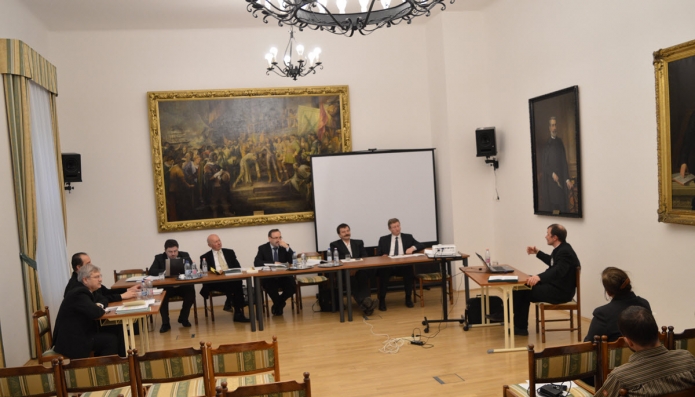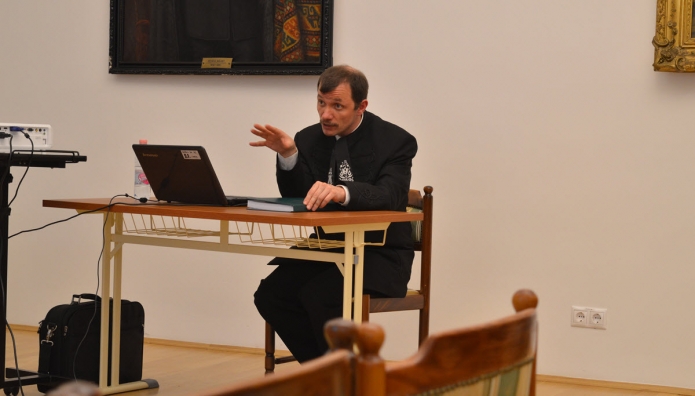The systhematic theological dissertation written on the "dialogue" about the free will between Calvin and Chrysostom was defended on 26. January 2016 at the Reformed Theological University of Debrecen.
Papp György has obtained his PhD


The major goal of this thesis was to analyse John Chrysostom’s quotations regarding Man’s free will in Calvin’s Institutes of the Christian Religion (ed. 1559). Calvin studied the writings of the Church fathers diligently throughout his life, thus broadening his knowledge incessantly. Although he never published his insights in this literature (there is no Calvin’s Florilegium Patristicum in print), we can still come to the solid conclusion drawing from his published books that he constantly benefited from this work, and used it to promote the cause of the Reformation. Drawing from the different statistics, it is quite clear that Constantinople’s admired bishop is the most quoted Greek author not only in the Institution but in Calvin’s overall work, and the third most quoted Church father.
After having reviewed the role the question concerning the freedom of the will played in the development of philosophical and theological thought, the research concludes that the question concerning the freedom of the will preoccupied theologians and philosophers alike all over the ages. The questions concerning free will is a continuous subject with regard to philosophy and religion, but with a continuously shifting emphasis: during the early church the debate concerned the nature of the question, but after the theological thinkers of the Middle Ages connected the eternal question to one’s merits, the reformers fought against it, or at least tried to impose some barriers on it. In studying this subject, however, it becomes clear that many factors work together when the general public receives or accepts a theologian’s thoughts, such as historical, cultural, devotional traditions and last but not least the theologian’s personal experiences.
The main body of the dissertation concentrates on an indepth analysis of Calvin's quotes of Chrysostom in the Institution. It is important to look not just to ideas "borrowed" from Chrysostom but first of all the context in which the bishop’s ideas appear. Thus it may be concluded that Calvin did not always interpret the church father’s words correctly. Calvin did not read the texts in their original language (Greek), but in the Latin translation. It is clear that in some parts of the Latin translation there are differences (in translation) when compared to the Greek version published by Migne (which is closer to the original texts in Greek). It is also clear that Calvin did not regard the literal contexts of the quotes, thus attributing such teachings to the Bishop of Constantinople which he never taught, or never taught like Calvin states. It may have also happened that Calvin did not take into consideration one or more homilies’ authorship questions, thus contributing to a perpetuation of a false Chrysostom interpretation. Even after taking into consideration these issues we can conclude that Calvin knew Chrysostom’s writings better than any of his contemporaries, and by citing him, he enriched reformation theology.
By presenting a short overview of how the question of free will continues to play a role in 20th century theology, György Papp aims to point out that the relevance of an analysis of the such a "dialogue" on the issue of free will is beyond doubt for our modern theological research. Viewed from a distance of several centuries we may conclude that Calvin’s and Chrysostom’s "worlds" (the duty of Man vs. the grace of God) are not in contradiction but complement each other. In our times this eternal question on the proper share of the human and the divine has to be addressed correspondingly, namely "to emphasise both the role of God and Man in this system, and try to find that thin line between the two, which takes into consideration the Scripture’s role in the immanent world, and at the same time thinks about Man like a creature on the 'thin line' between the immanent and transcendent world. But, before everything, this point of view requires a great degree of openness and a thorough knowledge of 'extinct worlds' and the theological, social, cultural contexts of our 'soon-to-be extinct' world."
The link to the thesis-booklet (including an English summary) is attached to this page. The full text of the dissertation is available via the Electronic Archives of the University of Debrecen, via this link.
The dissertation was supervised by Professor Botond Gaál (PhD, DSc) from the Reformed Theological University of Debrecen. Co-supervisor was Professor István Pásztori-Kupán (PhD, Dr. habil.) from the Protestant Theological Institute of Kolozsvár/Cluj-Napoca.